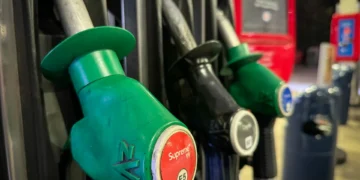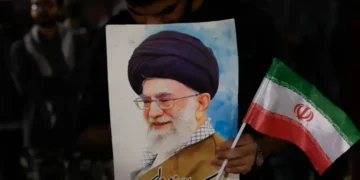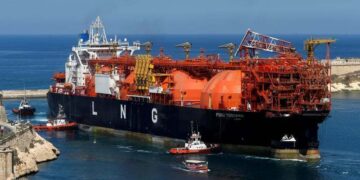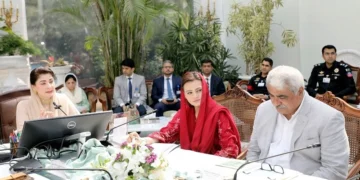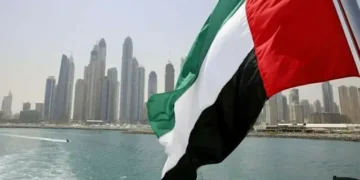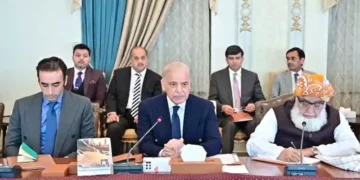The Founder of Pakistan, Quaid-e-Azam Muhammad Ali Jinnah, made a remarkable contribution to the creation of Pakistan. This was said by the Consul General of the People’s Republic of China, Mr Yang Yundong when he met a select gathering of the city’s elite at Quaid-e-Azam House Museum at a dialogue hosted by the Chairman Karachi Council of Foreign Relations and the Chairman Board of Management Quaid-e-Azam House Museum. The dialogue was followed by a lively question-and-answer session.
Chinese Envoy said It’s my great pleasure to participate in this event organized by the Karachi Council on Foreign Relations. First of all, I would like to extend my special thanks to Mme. Nadira Panjwani and Mr.Sadeed A. Malik, for your warm invitation and thoughtful arrangements. I am also grateful for the presence of all my friends here.
Quaid-e-Azam House Museum is a building of profound historical significance, and just now, I had the opportunity to see some exhibited pictures that provided me with a deep understanding of the remarkable contributions made by the “Father of the Nation” Jinnah, in the establishment of Pakistan.
Coming to Pakistan, our brotherly and friendly country, as the 17th Consul General of China in Karachi, I feel greatly honored. Over the past three months, I have deeply felt the warmth and hospitality of the people of Pakistan.
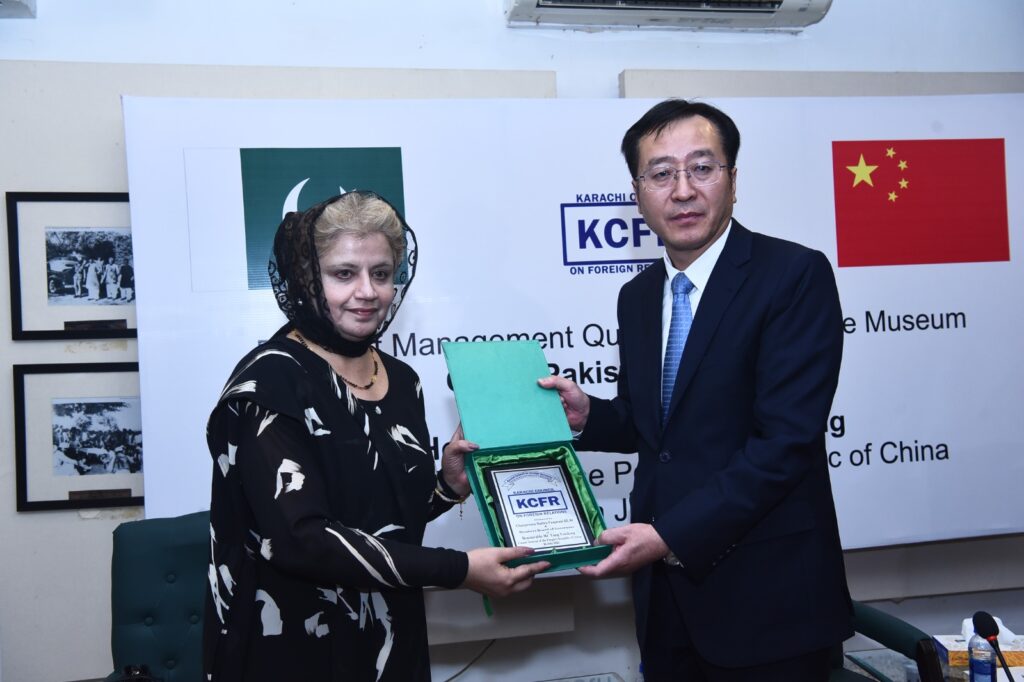

China and Pakistan are neighboring countries connected by mountains and rivers, relying on each other like lips and teeth. The ancient Silk Road, over 2,000 years ago, tightly connected the peoples of both countries. On May 21, 1951, breaking through the barriers of ideology and the Cold War ‘Iron Curtain’, the two countries formally established diplomatic relations.
CG said that Pakistan was the first Muslim country to recognize the People’s Republic of China.
In December 1956, Chinese Premier Zhou Enlai made an official friendly visit to Pakistan, and in October of the same year, Pakistani Prime Minister Huseyn Shaheed Suhrawardy visited China. The successful exchange of visits by the heads of governments within a year greatly promoted the development of friendly cooperation and people-to-people friendship between the two countries.
From 1965 to 1971, Pakistan consistently supported to the restoration of New China’s lawful seat and all rights in the United Nations as a sponsoring country.
In the 1970s and 1980s, frequent high-level visits between the leaders of China and Pakistan further strengthened our friendly cooperation. In 1978, the Karakoram Highway, constructed with Chinese aid, was completed and opened, serving as the only economic lifeline for the northern region of Pakistan. Hundreds of Chinese engineers and technical personnel sacrificed their lives for its construction, earning it the name of “China-Pakistan Friendship Highway.”
In the 1990s, as the world situation underwent significant changes, China-Pakistan relations stood the test of time and international upheavals and continued to develop. Entering the 21st century, the brotherly ties between China and Pakistan have grown even stronger. When a powerful earthquake struck northern Pakistan in 2005, the Chinese government rapidly dispatched rescue and medical teams, provided $20.5 million in relief materials and cash aid, and also announced $300 million in concessional export buyer’s credit for the reconstruction of the affected areas. Similarly, when China was hit by the Wenchuan earthquake in 2008, Pakistan stepped forward and donated all its tents to China’s earthquake-stricken areas.
In 2013, the China-Pakistan Economic Corridor was launched, and in 2015, Chinese President Xi Jinping successfully visited Pakistan, and both sides elevated the bilateral relations to an all-weather strategic cooperative partnership, opening a new chapter in our relationship.
During the difficult times of China’s fight against the pandemic, Pakistan extended its solidarity by donating all available relief materials to China and speaking out against politicizing the pandemic or stigmatizing China. When Pakistan faced the pandemic, China’s government, military, localities, enterprises, and social organizations provided continuous support by supplying medical materials and vaccines, dispatching medical expert teams, and assisting in Pakistan’s efforts to combat the pandemic and resume economic development and recovery.
History and reality fully demonstrate that, over the past 72 years, under the strategic guidance of leaders from both nations, China-Pakistan relations have forged ahead, comprehensively developed through the joint efforts of the governments and peoples of both countries and remained steadfast amidst the changing international landscape. It has formed an unbreakable ‘iron-clad’ friendship, which has not only become a precious strategic asset for both countries but also serves as an exemplary model of peaceful coexistence and mutually beneficial cooperation between nations with different social systems and cultural backgrounds.
Me. Funding, says Today, China-Pakistan relations enjoy closer high-level exchanges. Last November, Prime Minister Shehbaz was the first foreign head of government to visit China just after the conclusion of the 20th National Congress of the Communist Party of China, receiving high-level attention and reception from the Chinese side. The leaders of both countries have reached numerous important consensuses on the development of bilateral relations. In early May this year, both sides held the fourth China-Pakistan Foreign Ministers’ Strategic Dialogue in Islamabad, yielding fruitful outcomes.
Today, China-Pakistan relations witness more fruitful cooperation. CEPC has become a name brand of China-Pakistan cooperation. This year marks the 10th anniversary of the launch of CPEC. Over the past decade, CPEC has brought $25.4 billion in direct investment to Pakistan, accumulated revenues of $17.55 billion, tax payments of $2.12 billion, and created 192,000 job opportunities.
Under the framework of CPEC, both sides have completed more than 10 energy projects, including traditional energy projects such as the Qasim power plant, Thar Block I and Block II power plants, and clean energy projects such as hydro-power, wind and solar power, and transmission projects. These projects have assisted Pakistan in adding 6,000 megawatts of electricity and 886 kilometers of the national grid, greatly improving the capability of supplying power in Pakistan. CPEC has also built 510 kilometers of highways in Pakistan. As one of the major projects of CPEC, Gwadar Port and Free Zone has been put into operation for years. 4 special economic zones or industrial parks are under construction and will attract more investment from home and abroad. According to the latest figures of the State Bank of Pakistan, in the Financial year of 2023, Pakistan received USD432.7 million of Foreign Direct Investment from China, accounting for 30.09% of the total FDI coming to Pakistan. China continues to be the largest source of FDI in Pakistan.
All these concrete cooperation have made significant contributions to promoting Pakistan’s economic and social development, enhancing people’s well-being, and deepening people-to-people affinity and regional connectivity between China and Pakistan.
Today, China-Pakistan relations are deeply ingrained in mutual support and assistance. Both countries have shown mutual understanding, trust, and support on issues concerning each other’s core interests. Pakistan has consistently provided firm support to China on issues concerning Xinjiang, Tibet, Taiwan, and human rights. Similarly, China has consistently supported Pakistan in safeguarding national sovereignty, independence, and territorial integrity, as well as in promoting Pakistan’s economic and social prosperity.
When the devastating floods happened in Pakistan last year, the Chinese government and the Chinese people provided full assistance. During the evacuation operations in Yemen and Sudan, Chinese warships carried hundreds of Pakistani citizens, and Pakistani warships also assisted in the evacuation of several Chinese students. This year, in response to the continuous decline of Pakistan’s foreign exchange reserves, China has responded promptly to Pakistan’s urgent needs. China has provided necessary assistance by arranging loan extensions, effectively supporting Pakistan’s economic stability.
Last week, I participated in the induction ceremony of two frigates of Pakistan Navy, the two cutting-edged frigates were built in China. This fully demonstrated the close cooperation between the military force of our two countries. We can put more cases on such a list. Chinese President Xi Jinping once said during his visit to Pakistan, “Having gone through weal and woe together, we couldn’t feel more gratified to have each other as great neighbors and friends.”
Today, China-Pakistan relations exhibit greater strength in international collaboration. The two countries maintain close cooperation and collaboration within the framework of the United Nations, and Shanghai Cooperation Organization (SCO), and actively engage in trilateral dialogues with Afghanistan. Pakistan, alongside China, is committed to implementing Global Development Initiatives(GDI), Global Security Initiatives(GSI), and Global Civilization Initiatives(GCI), which were proposed by President Xi Jinping, jointly advancing global governance toward a more just and equitable direction.
Certainly, the development of China-Pakistan relations also faces some challenges, such as attempts by certain forces to sow discord and smear the cooperation between the two countries, especially attacking and discrediting the CPEC. Terrorism also poses a constant threat to our cooperation. However, China has confidence, determination, and the capability to work together with Pakistan to overcome all difficulties and challenges, and to ensure that the development of our relations remains steady and moves forward in the long run.
Ladies and gentlemen, friends, As the Chinese Consul General in Karachi, I hope that both sides can make greater efforts and progress in the following areas in the future:
Firstly, vigorously promote people-to-people exchanges to enhance mutual understanding.
In the past few years, the pandemic had some impact on people-to-people exchanges and cultural cooperation between China and Pakistan. However, starting from mid-March this year, China has adjusted its entry policies, and now we are witnessing an increasing number of exchanges between China and Pakistan. Chinese Consulate General is processing a significant number of visa applications from Pakistani citizens, especially business persons, intending to travel to China.
He said that, Currently, educational exchanges and cooperation between China and Pakistan are on the rise, and we welcome more Pakistani young students to study in China, hoping that they will return to their motherland after completing their studies and contribute more to the economic and social development of Pakistan. Envoy says, We also welcome members of the KCFR to visit China, and the Chinese Consulate General will provide convenience in visa applications to facilitate people-to-people connections between our two countries.
Secondly, advance the high-quality development of CPEC.
On July 11 this year, the meeting of the 12th Joint Cooperation Committee of CPEC, which was also the Special Meeting of the 10th-anniversary of CPEC, was held in Beijing. Both sides agreed that CPEC now has entered a new stage of high-quality development. And in the new stage, both sides will work together to enhance the quality and efficiency of CPEC construction, fully unleashing its development potential, strengthening cooperation in industry, agriculture, technology, mining, and socio-ecnomic sectors, and transforming CPEC into a model project for high-quality development under the Belt and Road Initiative. Both sides will continue to make efforts to ensure that all the CPEC projects generate more direct and extensive economic and social benefits. This will contribute to the construction of a closer China-Pakistan community with a shared future in the new era.
At present, both China and Pakistan are actively promoting the upgradation and renovation of the ML1 railway project. On July 10th, the railway authorities of China and Pakistan held the 21st meeting on the ML1 project in Beijing, exchanging in-depth and detailed opinions and reaching a positive consensus on accelerating the project’s implementation.
At the same time, both sides will strive to develop Gwadar Port into a high-quality port, a regional trade center, and an interconnectivity hub. We will maintain close communication with all parties involved and seek new achievements in these areas.
He said, Thirdly, assists in enhancing cooperation in industries, agriculture, and other fields. The construction of CPEC has laid a solid foundation for industrial and agricultural cooperation between China and Pakistan. We will continue to promote more Chinese companies to actively participate in Pakistan’s development and construction, making greater contributions to its economic development, improving people’s livelihoods and infrastructure construction.
Recently, the groundbreaking ceremony of the Dhabeji Special Economic Zone was successfully held. I believe that the special economic zone will attract more Chinese investment and contribute to strengthening industrial cooperation between our two countries.
In terms of agriculture, Chinese companies have actively carried out cooperation in chili peppers and canola seeds in Sindh Province, and some Chinese companies recently donated a batch of hybrid rice seeds to Balochistan Province. And not long ago, for the first time, Pakistan’s seafood was transported by land along the CPEC from Karachi to Kashgar, Xinjiang. Pakistan’s exports of sugars and sugar confectionery crossed USD18 million in the first half of 2023. Also according to the General Administration of Customs of China, Pakistan Himalayan pink salt exported to China reached USD4.96 million in 2021 and 5.75 million in 2022, a year-on-year increase of 15.7%. I hope the trade between our two countries can develop in a more speedy and balanced way.
We welcome more business persons to China to seek more opportunities for cooperation.
Consul General said that the Chinese Consulate General is committed to playing a bridging role in elevating bilateral cooperation.
Fourthly, strengthen capacity building in communication and tell the touching stories of China-Pakistan cooperation. The 20th National Congress of the Communist Party of China has outlined a magnificent blueprint for fully promoting the great rejuvenation of the Chinese nation through Chinese modernization. In the new historical context, China’s development is forging ahead, and China and Pakistan are striving to build a closer community of shared future. This is a higher goal of China-Pakistan cooperation and will also play a leading and exemplary role in international relations.
Think tanks play an extremely important role in shaping the image of China-Pakistan cooperation. We are willing to actively promote cooperation between Chinese and Pakistani think tanks in joint research, personnel exchanges, sharing publications, and organizing events, to inject more positive energy into China-Pakistan cooperation and make the strongest voice of friendship between our two countries resonate widely, letting the touching stories of China-Pakistan cooperation be known to all and the friendship between China and Pakistan be passed down from generation to generation.
Madam Nadira Panjwani, Commodore (Retd) Sadeed Malik, Ladies and gentlemen, friends, The door of the Consulate General of China in Karachi is always open to friends from all walks of life in Pakistan. I welcome all of you to visit the Consulate General, strengthen the “iron-clad” friendship between China and Pakistan, and promote friendly cooperation.






